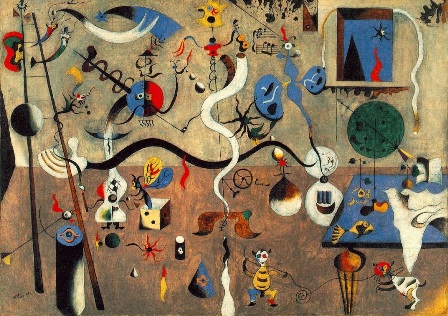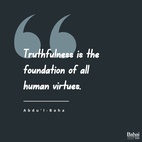The views expressed in our content reflect individual perspectives and do not represent the official views of the Baha'i Faith.
 [Editor’s Note: This is the second installment of a six-part essay. Click here to read from the beginning.]
[Editor’s Note: This is the second installment of a six-part essay. Click here to read from the beginning.]
Let’s review – I’ve narrowed down my most profound inner questions to five, and now we’re starting the journey. In my analogy of getting from downtown Austin to Thunder Bay, Ontario, with five turns, the trick, of course, involves making the vast majority of the drive on a single road, Interstate 35. The most important turn I make, then, involves getting going the right direction on I-35. If I somehow enter the highway going south instead of north, then Moxie’s Classic Grill gets more and more distant. So it pays to take our time and really nail that first crucial decision; it’s the foundation for everything that comes after it.
First, we have to say upfront that there can be no proof of God nor disproof of God; God is both unprovable and nonfalsifiable — so if you’re looking for proof you can skip the rest of the essay. Of course, this doesn’t mean no evidence of God exists. Indeed, He has left His fingerprints on everything. The incomparable interdependent genius of nature, often presented as Exhibit A of some kind of intelligence at work in whatever force continuously creates the universe, comprises a force far, far beyond our own intelligence. This may be affirming for those who already believe, but skeptics may counter that this is not, in and of itself, proof of anything more than that nature’s laws can produce amazing results.
What cannot be so easily batted away, in my opinion, is how and why nature inspires human beings. Science can explain the optics of a fiery sunset, but it cannot explain why that sunset can also bring tears to the eyes of the viewer. The meaning with which we imbue our world has no explanation in purely evolutionary terms. Group psychology, evolutionary psychology, and brain chemistry can explain many behaviors — but deep and spiritual love one for another? Sacrifice and even martyrdom to an ideal? Passion for art? I think not.
These simply do not appear to be the province of the material world, and at the very least are not qualities found anywhere outside ourselves. To try to reduce all human experience to the cold calculations of natural law simply seems a stretch, let alone to assign the love and inspiration one feels in her own life to mere calculations. No matter how complex, stripping life of inner meaning, or nihilism, seems to be a contortion designed merely to relieve oneself from considering the ramifications of a non-material plane.
Our old friend C.S. Lewis masterfully points out the contradiction in nihilism:
If the whole universe has no meaning, we should never have found out that it has no meaning: just as, if there were no light in the universe and therefore no creatures with eyes, we should never know it was dark. Dark would be a word without meaning.
This deserves meditation.
I empathize with those who don’t believe in God, for many reasons, not least on grounds that the universe often appears to be coldly indifferent to us. Disease and starvation beset innocent children. Those who eat right and exercise keel over from a heart attack, while the greedy, not the meek, appear to inherit the earth. A deeper reading, however, shows that the vast majority of humanity’s wounds seem self-inflicted, and more often than not because we have stubbornly ignored the advice of God’s messengers. As for the calamities that are not self-inflicted, we can conclude that volatility in the universe must exist for free will to exist. This volatility can come at a harsh price. We can also conclude that, while there may be a life after death, in this life God seems to place a premium on collective progress, sometimes at the expense of individual welfare.
Can we rationally believe in something we can’t prove? For some people, the answer is no, though I suspect if one scratched the surface he would find they apply this logic selectively. For me, it seems entirely rational to proclaim belief in something with no conclusive proof — but for which the cumulative evidence is not only sufficient but overwhelming. For me, the question of God’s existence fits squarely in this category.
If thou wishest the divine knowledge and recognition … apply thyself to rational and authoritative arguments. For arguments are a guide to the path and by this the heart will be turned unto the Sun of Truth. And when the heart is turned unto the Sun, then the eye will be opened and will recognize the Sun through the Sun itself. Then man will be in no need of arguments (or proofs), for the Sun is altogether independent, and absolute independence is in need of nothing…. – Abdu’l-Baha, Baha’i World Faith, p. 383
Read the next article is the series: Why Baha’i? Question #2: Is God “personal”?
Read the previous article in the series: Why Baha’i? It Comes Down to Five Questions


















Comments
Sign in or create an account
Continue with Facebookor